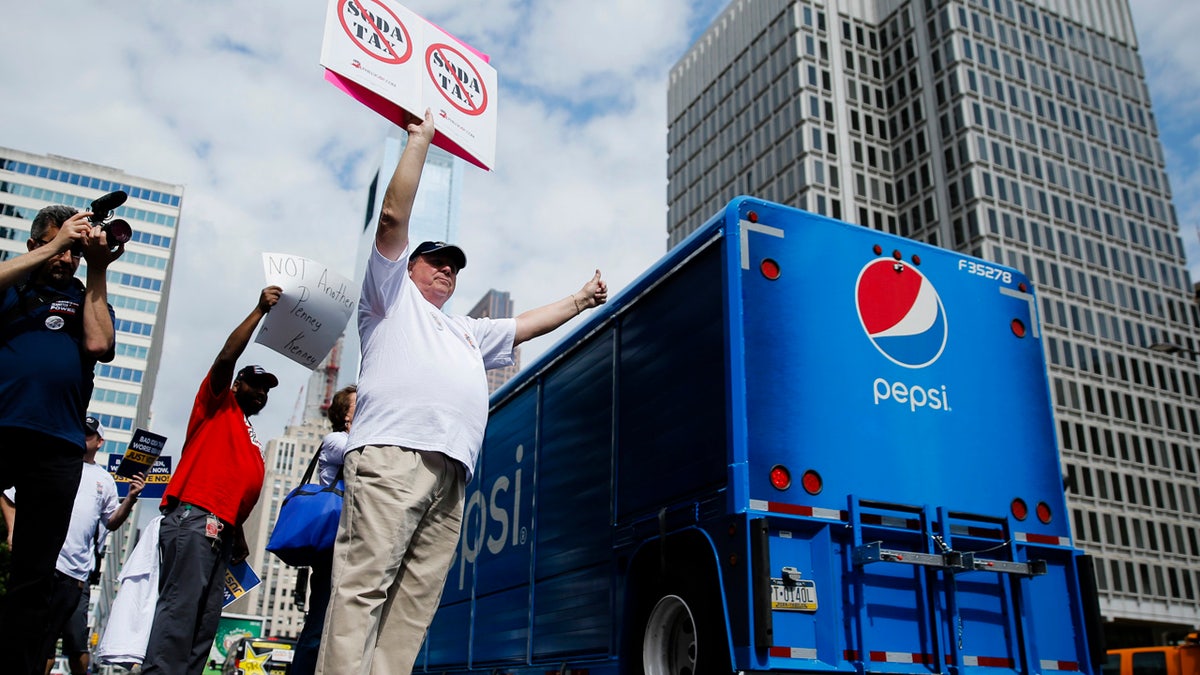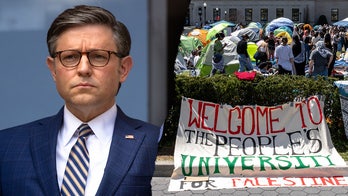
June 8, 2016: Opponents of a proposed sugary drink tax demonstrate outside City Hall in Philadelphia. (AP)
Local governments are always thirsty for revenue – and their taste for a soda tax keeps getting stronger, fueling a new battle this fall with America's beverage industry.
Boosted in part by anti-soda warrior and former New York City Mayor Michael Bloomberg, proponents are trying to get a tax on sugary drinks approved at the ballot box in at least four more municipalities.
The initiatives mark a resurgence of sorts for the soda tax crusade. According to the American Beverage Association, voters have rejected 43 such measures in the past eight years. But in a major win for the movement, the Philadelphia City Council approved a 1.5-cents-per-ounce soda tax this past June.
Now, three California municipalities – San Francisco, Oakland and Albany – are slated to vote on a soda tax of a penny per ounce. Boulder, Colo., could double that, if voters OK a 2-cents-per-ounce tax. The initiatives, which have been approved for the ballot, target sugary drinks.
Advocates cite health benefits in pushing the proposals. “The goal of taxes on sugar-sweetened beverages is to reduce consumption of sugar-sweetened beverages, which science has proven to be directly correlated to detrimental health impacts such as diabetes, obesity and heart diseases,” San Francisco Board of Supervisors member Malia Cohen told FoxNews.com.
Bloomberg, often ridiculed for his efforts to ban the big gulp in his home city, spent $1.6 million to advocate for the passage of the Philadelphia tax and reportedly will be bankrolling efforts in San Francisco and Oakland as well.
But the American Beverage Association is staunchly opposed. ABA spokeswoman Lauren Kane said the Philadelphia tax is highly unpopular and shouldn’t be a model for any other city.
“This is a regressive tax, it raises the price of groceries and it’s discriminatory because it singles out a single product in the grocery cart,” Kane told FoxNews.com. “Once the government reaches into the grocery cart, everything else is vulnerable.”
The beverage association contends that soda consumption is at a 30-year low, yet obesity has continued to climb in recent years. Further, it notes West Virginia, Arkansas and Tennessee all imposed some soda tax, but rank among the most obese states in the nation.
“There is no single product that is responsible for obesity,” Kane said.
So far, only Berkeley, Calif., has enacted such a tax with voter approval, OK’ing a 1-cent-per-ounce tax in the 2014 election.
If a city the size of San Francisco adopts a tax at the ballot box, it could be a model for others, advocates hope.
“San Francisco has always been a pioneer in landmark legislation and I have no doubt the passage of a sugary beverage tax in San Francisco will encourage other municipalities to seriously consider implementing a similar tax,” said Cohen, who led the effort to have the measure placed on the ballot.
San Francisco would appear the most likely to adopt the measure since 56 percent of voters backed a proposed 2 percent tax increase in 2014. It needed a two-thirds majority to pass because the tax revenue was dedicated for a specific purpose. This year, it’s a proposed 1 cent-per-ounce tax that requires only a simple majority, since the revenue would be going to the general fund. If approved, the tax is projected to bring in $14.4 million annually – money supposedly to be used for health and nutrition programs.
Therein lies another concern. Kane said the revenue would be going into the general budget “with no strings attached” – so voters wouldn’t even know if the revenue would be used “to fight obesity.”
The ABA has a formidable foe in Bloomberg. He telegraphed his plans in a statement issued after the Philadelphia tax victory.
“In November, voters in three California cities will take up the issue, and it may also come before voters in Boulder, Colorado,” Bloomberg said. “When cities lead the way, solutions that were once considered non-starters can quickly catch fire and spread around the world. It would not be the first revolution Philadelphia has sparked.”
The issue even worked its way into presidential politics this year. After eventual Democratic nominee Hillary Clinton said she was “very supportive” of the Philadelphia proposal in April, her opponent Vermont Sen. Bernie Sanders wrote an op-ed for Philadelphia Magazine calling it a “regressive grocery tax that would disproportionately affect low-income and middle-class Americans.”
Cohen objects to the charge of a regressive tax.
“What this assumption ignores is the fact Type 2 Diabetes is a regressive disease,” Cohen told FoxNews.com. “At today’s rate, 50 percent of African American youth vs. 25 percent White youth will contract Type II Diabetes in their lifetime. This is not a coincidence and we must do something today to address this crisis.”




